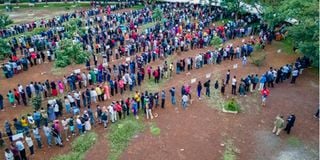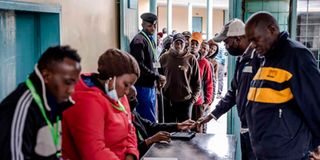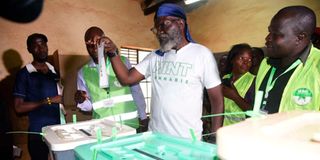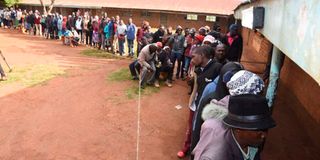Premium
Delays at polling centres as Kiems kits malfunction

Residents queue to cast their votes at the Kenyatta Sportsgrouns polling station in Kisumu County on August 9, 2022.
What you need to know:
- The failure of the Kiems kits saw the IEBC allow the use of the printed register in Makueni and Kakamega counties.
- Perhaps the delays across the country partly explained the low turnout by noon, which stood at 6.6 million or 30 per cent of the 22 million registered voters.
- If none of the 10 fingers is identified, the polling clerks resort to an alpha-numeric search, where a voter’s passport or identity card is scanned
Electronic voter identification kits malfunctioned in parts of the country, causing delays in voting and prompting the electoral commission to authorise the use of the manual register in some regions.
The failure of the Kenya Integrated Elections Management System (Kiems) kits, used to identify voters through fingerprint sensors, saw the Independent Electoral and Boundaries Commission (IEBC) allow the use of the printed register in Makueni and Kakamega counties.
The directive affected 84 polling stations in Makueni county and 154 in Kakamega, IEBC vice-chairperson Juliana Cherera said.
There was also confusion in polling stations as to the next course of action if the kits failed to identify a voter.
Some poll officials turned voters away, asking them to return later, while others delayed voting as they tried to sort out the technological failures, highlighting the confusion that followed contradictory court rulings on the use of the manual roll.
This was the case in Makueni, where voting was delayed for more than five hours in multiple polling stations amid the confusion on whether to resort to the use of the manual register after Kiems kits failed.
Perhaps the delays across the country partly explained the low turnout by noon, which stood at 6.6 million or 30 per cent of the 22 million registered voters.
There were also protests about voters whose names were missing at polling stations where they have previously voted.
This was the case with Mr Peter Gikonyo who said he had voted at Nairobi River Primary School in previous elections but was told he was registered in Rwathia, Murang’a.

Voters queue to have their information verified on the Kenya Integrated Electoral Management System (KIEMS) at a polling station during Kenya's General Election at Kariokor Community Centre in Nairobi, Kenya, on August 9, 2022.
Manuel register
The High Court, following a petition by the Azimio la Umoja One Kenya Coalition party, directed the IEBC to ensure the use of the manual register in identifying voters.
But following an appeal by the United Democratic Alliance (UDA), the Court of Appeal on Monday quashed the High Court decree and ordered the commission to only have the printed register as a backup should the electronic system collapse.
However, the commission yesterday insisted that the poll kits failure was not widespread.
“We have received 200 failure reports out of the 46,229 kits we have deployed countrywide. The failure is not widespread. Technology does break down and we have ways to address that, which we have done. We expect that one or two may present a malfunction but that does not mean it is widespread,” IEBC commissioner Justus Nyang’aya said.
Yesterday, it would appear there was no clarity to the poll officials as some held up voting once the kits malfunctioned, a decision that initially saw Roots Party presidential candidate George Wajackoyah fail to vote.
Prof Wajackoyah had turned up at Indangalasia Primary School at 10.15 am to cast his ballot, but officials said the kits had stopped working and had requested direction from the IEBC headquarters.
“You would have started from here. But we’re experiencing a challenge. The problem is with the machine. There is nothing we can do. We have communicated to the headquarters, and they said they are coming. If it’s okay, voters will be given their 11 hours from the time we start,” an official told Prof Wajackoyah.

Roots party presidential candidate George Luchiri Wajackoyah voting at Indangalasia Primary School in Kakamega County on August 9, 2022. Local politicians in Western counties have pleaded with the IEBC to extend the voting time to compensate for the time lost due to technology failures.
The official assured Prof Wajackoyah that once the issue was resolved, he and the other voters in the polling station would be allowed back to the station.
“I don’t understand. Why is it not working? Can’t you just scan our identification documents and we vote?” Prof Wajackoyah protested.
He only voted later when the manual register was available.
Mix-up
About 17 polling stations in Mumias West Constituency also reverted to the manual roll after experiencing technical hitches with the Kiems kits, returning officer Daniel Amach said.
Voting at Mubukuro Primary School polling centre in Chuka Igambang’ombe constituency, Tharaka Nithi County started at 4.20 pm due to missing Senate ballot papers.
Angry voters paralysed the exercise at the centre, insisting it would only resume once the papers are available.
County returning officer Mohammed Raka said there was a mix-up of the papers during packaging.
“The ballot papers had been wrongly labelled and that is why they were taken to Tharaka constituency instead of Chuka/Igambang’ombe constituency,” Mr Raka said. He noted that the lost time would be compensated to ensure all voters cast their votes.
Voters at Ciangera Primary School in Mbeere North, Embu, were forlorn as they stood in the queue. Some voters opted to leave.
The frustration was shared with the electoral officials who kept on rebooting the Kiems kits.
This was the situation in many polling stations in Mt Kenya East, where voting was delayed by the malfunctioning kits.
“There is no electricity in this school and we have asked for a backup power bank, but we’re afraid of what would happen in case the power goes off,” a presiding offer told the Nation.
She said the kits were slow to identify voters and that some voters had left without voting. The school has two voting stations.
The hitches were also reported at Kiamukuyu polling centre in Mbeere South constituency.
In Mumias West constituency, voting had not begun by 7.50 am at St Anne’s nursery polling station.
IEBC officials noticed a technical hitch at 6 am when polls opened and raised the issue with the ICT. However, nearly two hours later, nothing had been resolved.
“The hitch with the Kiems kit has been caused by failure of the fingerprint detector to function and so voters cannot be identified digitally,” the presiding officer at the polling station explained.
Delays due to fingerprint identification challenges were experienced in some of the stations in Bullapesa and Wabera wards in Isiolo. Voters waited longer, as others opted to leave.
Further confusion arose from voters who were unable to identify the streams where they were to vote.
In Mandera, failure of biometric kits was reported in Mandera East, Mandera West and Mandera South constituencies.
Suspected terrorists
On Monday, suspected terrorists blew up two classrooms at the Hareri Primary School polling centre and an explosive went off in the same area later in the day, spreading fear among locals.
Voters at Mandera Polytechnic had to wait for hours before voting resumed. “I’ve been waiting since 6 am when the station opened and I’m yet to vote. I’m told the Kiems kit failed,” Ms Halima Ali said.
The centre has at least five polling stations but only one stream was affected.
“We had issues with the first Kiems kit we had earlier provided but we have fixed the hitch and all is going on well,” Mr Mohamed Olow, the Mandera East returning officer said.
Voting was delayed in various parts of the South Rift after the kits failed to identify some voters.
In Subukia constituency, election officials used alternative means to identify voters, leading to delays.
At Subukia Primary polling centre, for instance, more than 10 voters could not be identified by the kit, because they had worn out fingerprints.
“We have so far assisted about 10 voters, who had no fingerprints, to vote. We had to use their identity cards to identify them. Most of them are elderly people,” Mr John Mwangi, a presiding officer said.
At St John’s Catholic Church, another polling centre in Subukia, some voters did not have fingerprints.
The polling clerks rubbed the voters’ fingers with a handkerchief and dusted them with chalk before their fingerprints could be read.
In Laikipia, election officials took photographs of the senior citizens to identify them after the kits failed to read their fingerprints.
For instance, at Nyahururu DEB Primary School in Laikipia West, a presiding officer said that a kit had failed to detect the fingerprints of a number of voters, but the same kit would successfully detect the fingerprints of other voters.
“In such an occurrence, the voter is allowed to fill a voter verification form, a photograph of the voter is taken while holding his or her identity card and one is allowed to vote after successful recognition by the kit,” said the officer.
Some voters expressed disappointment after the Kiems kits failed to identify them. Among them was Ms Grace Kuryamaat, 78, who arrived at the Mogondo polling centre in Emurua Dikiir constituency to cast her vote, only to be told that her details could not be extracted.
'Desperate acts'
In the Kiems kit, voters’ 10 fingers are scanned. One positively identified finger is considered a positive identification.
If none of the 10 fingers is identified, the polling clerks resort to an alpha-numeric search, where a voter’s passport or identity card is scanned, and when a positive result pops up, they are asked to place their finger on the kit for their biometrics to be recorded.
In the North Rift, the strict use of the kits to identify voters subjected the elderly to desperate acts.
In various polling stations in Elgeyo-Marakwet, Uasin Gishu and West Pokot counties, the elderly, whose fingerprints could not be detected, resorted to scrubbing their palms on rocks, rubbing them together, warming them up over gas lamps and applying a coat of petroleum jelly in a bid to soften them.
At Turesia polling centre in Elgeyo-Marakwet, 10 elderly women warmed their hands over a gas lamp.
“Some of them have tried over 10 times to no avail. We have devised all means to ensure they vote and that’s why you are seeing them warming up their hands because they should exercise their democratic rights,” presiding officer Hillary Kosgei explained.
“When their hands are warm, their fingerprints become visible and the kits recognise them,” he said.
Ms Kabon Kapkong, 80, lamented that her hands were almost burning after warming them for several minutes.
Ms Tapsingoei Kibet, 90, tried 13 times before the kit recognised her fingerprints. “Maybe I’m too old and my blood is little, making my fingers numb and frail to a point of losing the identity,” she told poll officials.
In West Pokot County, Ms Beatrice Nasiebanda, 72, and Ms Chepchemuse Munango, 82, were disillusioned due to the hitches.
“I’ve been told to wait and I hope I’ll get a chance to cast my vote,” Ms Nasiebanda said.
Some casual workers, too, were turned away after the kits failed to detect their fingerprints.

Members of the public queue to cast the ballot at Limnyomoi Primary School Polling Station in Soy Constituency, in Uasin Gishu County on August 9, 2022.
Failure of the Kiems kits and delays in the opening of polling stations also marred voting in Kisii, Nyamira and Migori counties.
In some centres, the kits were slow in processing the biometrics of voters, causing major delays. Many tea pluckers faced challenges as the gadget could not recognise their biometrics.
In Migori, Azimio la Umoja One-Kenya Coalition Secretary-General and Suna East MP Junet Mohamed raised concerns over failure of the kits.
“IEBC should address this urgently. When we were saying the manual register should be available, we were talking about this,” he said at Migori Muslim Primary after casting his ballot at the municipal hall.
In Kisii, several candidates expressed fears that the technical hitch would suppress voter turnout as many people did not vote.
“Our IT officers moved there with speed and on checking the gadget, they realised that it was working, though slowly,” said Nyaribari Chache Constituency Returning Officer Mark Manco.
Single-parent
In South Mugirango, where many residents are soapstone carvers, the kits failed to recognise several voters.
In Nyaribari Masaba, electoral officials urged voters who could not be identified to wash their hands well.
In Kitutu Masaba constituency, many elderly voters could not be identified. At Nyakongo DEB primary polling centre, presiding officer Dolphine Obonyo remained optimistic about the progress despite the technical challenges.
“We are glad that there’s a good turnout and we’re moving on well with the exercise but the challenge remains that the elderly group cannot easily be identified by the system, that is why we are moving a bit slow,” she said.
County returning officer Anthony Njoroge said no voter was turned away because of system failure.
In Kwale’s Kinango constituency, voters were not allowed into some polling stations after the Kiems kits failed. Some polling stations in Kibo South and Kombani in Matuga constituency and Kikoneni in Lungalunga constituency were affected.
Mr Daniel Mutua, a voter at Kikoneni Primary School in Lungalunga constituency, said that by 12 pm, he was yet to vote.
“Some of the voters have decided to go back home because they were here before 6 am,” said Mr Mutua.
Kwale County Returning Officer Obadiah Kariuki said a team from the electoral commission ICT department was working to rectify the challenge.
In Nyali, Mombasa County, IEBC replaced the defective Kiems kits. Returning Officer John ole Taiswa said in polling stations where there were delays because of a technical hitch, voters would be compensated with additional time.
At the Maweni polling station in Nyali, a Kiems kit failed to work for 30 minutes.
IEBC polling clerks in various polling stations in Lamu Old Town complained that Kiems kits failed to identify many Swahili women voters who have applied henna on their fingers.
Lamu County Deputy Returning Officer Mohamed Ali said henna ink makes it difficult for fingerprint recognition.
Voting in most parts of Wundanyi constituency in Taita Taveta County was delayed by faulty kits and poor internet connectivity. IEBC polls manager Eisha Oshan said the ICT department intervened after the complaints were raised.
In Kilifi, the Kiems kit failed to work at the Isaack Nyondo polling station in Rabai constituency.
At Dabaso Primary, where ODM governor candidate Gideon Munga’ro voted, one stream was delayed until 8.45 am after Kiems kits failed.
Reporting by David Muchunguh, Fred Kibor, Barnabas Bii, Oscar Kakai, Hellen Shikanda, Waweru Wairimu, Manase Otsialo, Eric Matara, Steve Njuguna, Alex Njeru, Patrick Ng’eno, Purity Kinuthia, Mkamburi Mwawasi, Lucy Mkanyika, Siago Cece, Anthony Kitimo, Charles Ongandi, Steven Heywood, Maureen Ongala, Kalume Kazungu, Brian Ocharo, Philip Muyanga, Ruth Mbula, Wycliffe Nyaberi and Benson Ayienda




